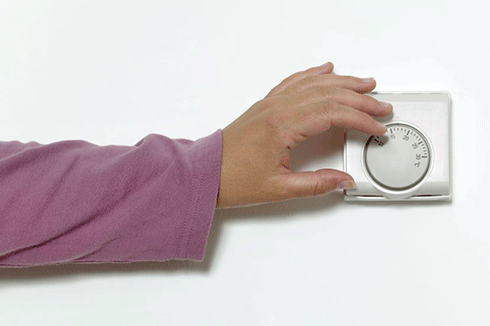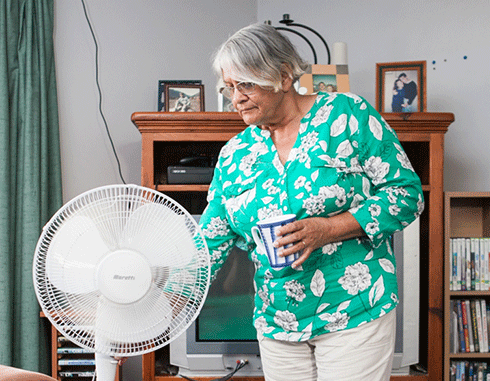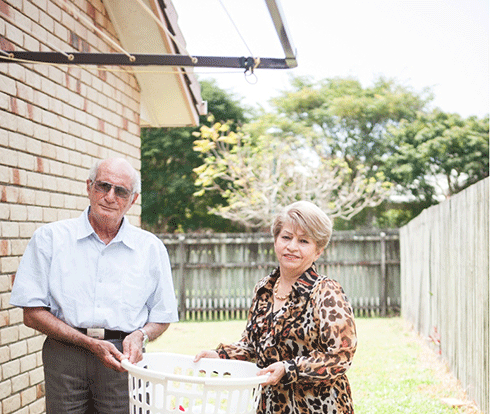
|
Published: 26 November 2013
Breaking bad habits can save on power bills
One of the solutions, often overlooked, to the problem of rising power bills in Australia, is energy efficiency – being smarter about the way we use gas and electricity. A recent CSIRO study aimed at promoting energy-saving habits among low-income earners has produced valuable insights into how best to motivate people and help them capitalise on life’s ‘habit-breaking’ moments.

|
|
Energy savings are as easy as setting cooling and heating thermostats slightly lower in winter (18°C) and higher in summer (24°C). Credit: Richard Thomas/123rf.com
|
The EnergySavers pilot study – conducted in 2011–2012 in Brisbane and Victoria – was designed to improve household energy efficiency and reduce energy bills, while increasing occupant well-being through improved heating and cooling usage.
Among the 132 participants who completed the program were seniors on government pensions, newly arrived migrants and single parents. While some participated in weekly, face-to-face group sessions, others participated in online learning.
The program, which ran for 5 weeks, was so successful that a version of it is now being rolled out to 1000 low-income seniors in Brisbane.
Because low-income households tend to spend proportionately more of their disposable income on electricity than more affluent households, they are more vulnerable to rising energy costs.
Despite this, energy-saving programs in Australia and overseas have tended to target householders with higher than average incomes and educations. Dr Nina Hall, who led the design of the pilot program, says this may be partly because recruiting people from this demographic can be difficult.
‘If people don’t feel in control of their living circumstances – if they’re in government housing, or even private rental – they might not feel there is much they can do. And there is often quite a high level of scepticism about services offered to them.’
EnergySavers drew people into the program by tapping into their existing social networks. This meant recruiting participants through community centres, faith groups, ethnic community groups and retirement villages. For one group, the program was delivered via English classes run at a local community centre: the EnergySavers’ written and audiovisual material formed the main curriculum for the students.
‘The importance of running the program in existing groups sounds simple – and it is,’ says Dr Hall. ‘But there is actually a lot going on there.
‘It means participants are comfortable with the location, and familiar with the other people in the program – who are often from similar backgrounds – so they can express their views without feeling they might be judged. And also a trust in the organisation that is hosting the program.’
The design of program materials required care. Before writing the program, CSIRO interviewed social service organisations and held focus groups with the target audience for guidance. The resulting EnergySavers information was designed to be accessible to participants with lower levels of literacy. Magazines featured large text, short conversational testimonials and many images. Video clips followed a ‘morning TV show format’ with an anchor and text hints on the screen.
As might be expected, participant surveys revealed a higher level of energy-saving actions among those attending the face-to-face sessions, compared to those participating online or receiving information only. Session convenors were non-experts, given basic training in leading groups.
‘It was a relaxed environment. I felt I could speak freely about my situation and I could relate to other people’s experiences,’ says Samantha Burgess, a single parent who participated in the face-to-face program. ‘It really opened up the discussion within the group to spark new ideas on saving energy.’

|
|
Fans are much cheaper to run than an air-conditioners: 3c per hour versus 70c per hour. Credit: CSIRO
|
Dr Hall says one of the aims of the study was to make sure the discussions were owned by the participants rather than ‘outside’ experts.
‘Many of our volunteers came from the social group that the program was delivered into, such as the community centre or retirement centre,’ she explains. ‘And the value of the discussion, which we heard time and time again, was along the lines of “I like hearing it from people I trust, people who are like me, people who’ve tried it in a situation like mine”.’
Among those most receptive to the program were recently arrived migrants, including refugees, who participated through regular English classes at local community centres. Could it be that these people were at what behaviour change theorist, Professor Bas Verplanken, calls a ‘habit discontinuity’ moment in their lives? According to Prof Verplanken, because habits are cued by context, the best chance of behaviour change comes when the context changes.
Dr Hall agrees. ‘The migrant participants valued the EnergySavers program because they were in a new country, starting a new chapter in their life, including this program. The first session was about your rights and rebates and what to do when a doorknocker turns up offering new deals on your energy bill.
‘The extent of behaviour change that can happen at these moments of significant life change is quite substantial.’

|
|
EnergySaver program participants drying clothes on a clothesline rather than in a dryer: even a small dryer, run three times a week, costs $2 per week (over $100 per year). Credit: CSIRO
|
Apart from saving money, the indirect benefits of energy-saving behaviours for low-income earners include improvements in their social life.
‘During the focus groups, participants told us they were reticent to host people in their homes because they couldn’t afford to heat or cool their homes to a desired level of comfort,’ says Dr Hall.
‘The EnergySavers program provided no-cost or low-cost ways to more efficiently use energy. This ensures people can be warm, have lighting, cook, have the TV on – activities that are crucial to bringing people together,’ says Dr Hall.
‘Knowledge really is power, really,’ says Samantha Burgess. ‘If you can have that, then you can make positive changes not only for the environment, but financially as well. It’s good to be able to feel more in control of our electricity bills.’
More information



